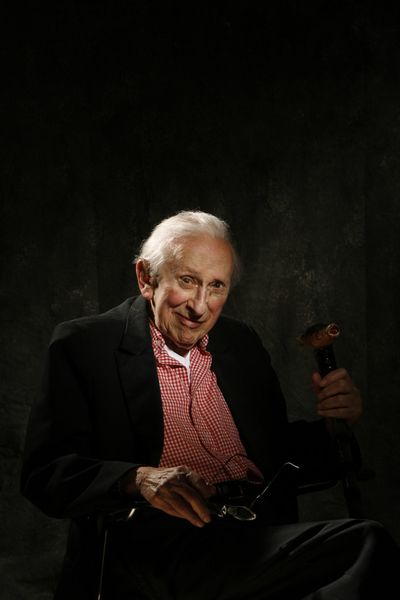Common-man author Studs Terkel dies at 96
Unabashed liberal won Pulitzer Prize

CHICAGO – Studs Terkel, the ageless master of listening and speaking, a broadcaster, activist and Pulitzer Prize-winning author whose best-selling oral histories celebrated the common people he liked to call the “non-celebrated,” died Friday. He was 96.
Dan Terkell said his father died at home, and described his death as “peaceful, no agony. This is what he wanted.”
Terkel was born Louis Terkel on May 16, 1912, in the Bronx. He moved to Chicago as a child and came to embrace and embody his adopted town, with all its “carbuncles and warts,” as he recalled in his 2007 memoir, “Touch and Go.” He was a cigar and martini man, white-haired and elegantly rumpled in his trademark red-checkered shirts, an old rebel who never mellowed, never retired, never forgot, and “never met a picket line or petition I didn’t like.”
“A lot of people feel, ‘What can I do, (it’s) hopeless,’ ” Terkel told the Associated Press in 2003. “Well, through all these years there have been the people I’m talking about, whom we call activists … who give us hope and through them we have hope.”
The tougher the subject, the harder Terkel took it on. He put out an oral history collection on race relations in 1992 called “Race: How Blacks and Whites Think and Feel About The American Obsession,” and, in 1995, “Coming of Age,” recollections of men and women 70 and older.
He cared about what divided us, and what united us: death – in his 2001 “Will the Circle Be Unbroken? Reflections on Death, Rebirth, and Hunger for a Faith,” and hope, in his 2003 “Hope Dies Last.”
Terkel won a 1985 Pulitzer Prize for “The Good War,” remembrances of World War II; contrasted rich and poor along the same Chicago street in “Division Street: America,” 1966; limned the Depression in “Hard Times,” 1970; and chronicled how people feel about their jobs in “Working,” 1974.
Andre Schiffrin – Terkel’s longtime editor, publisher and close friend who gave Terkel the idea for many of his books – said Terkel “had been in bad shape in recent weeks and he really felt that his life had come to an end. But he was as engaged as ever. He was a big fan of (Democratic presidential candidate Barack) Obama and he said one of the things that kept him going was that he wanted to see the results of the election.”
For his oral histories, Terkel interviewed his subjects on tape, then transcribed and sifted. “What first comes out of an interview are tons of ore; you have to get that gold dust in your hands,” he wrote in his memoir. “Now, how does it become a necklace or a ring or a gold watch? You have to get the form; you have to mold the gold dust.”
Said Schiffrin: “He liked to tell the story of an interview with a woman in a public housing unit in Chicago. At the end of the interview, the woman said, ‘My goodness, I didn’t know I felt that way.’ That was his genius.”
He also was a syndicated radio talk show host, voice of gangsters on old radio soaps, jazz critic, actor in the 1988 film “Eight Men Out,” and survivor of the 1950s blacklist.
Terkel’s politics were liberal, vintage FDR. He would never forget the many New Deal programs from the Great Depression and worried that the country suffered from “a national Alzheimer’s disease” that made government the perceived enemy. In a 1992 interview with the AP, he advocated “pressure from below, from the grass roots. That means the people who live and work in cities – that used to be called the working class, although now everyone says middle class.”
He got the nickname Studs as a young man, from the character Studs Lonigan, the protagonist of James T. Farrell’s beloved trilogy of novels about an Irish-American youth from Chicago’s South Side.